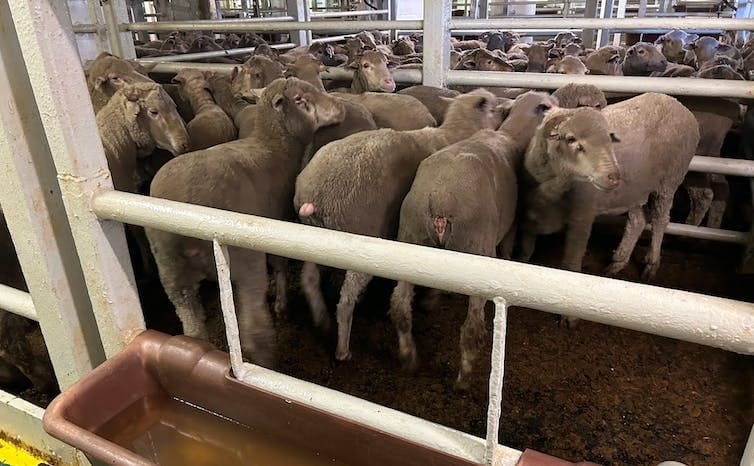
A LIVE export ship bound for the Middle East has been sent back to Australia due to concerns about the rising tensions in the Red Sea.
The MV Bahijah departed the Port of Fremantle in Perth on January 5, loaded with sheep and cattle, before diverting towards South Africa and ultimately being ordered back to Australia by the Federal Department of Agriculture.
Tensions have been rising in the Red Sea, which is a major shipping channel from Australia to Europe and the Middle East, with attacks on vessels causing militaries from the United States and the United Kingdom to step in.
The agriculture department released a statement last Friday saying it was considering options before giving out update on Saturday to say it had ordered the ship back to Australia.
“To ensure the health and welfare of the livestock on the MV Bahijah, the department directed the exporter that the consignment be immediately returned to Australia,” the statement said.
“In making this decision the department considered the biosecurity risks associated with the livestock and the vessel and has not identified any basis on which these could not be managed within Australian territory.”
The MV Bahijah was formerly called the Ocean Outback, before Wellard sold it to an Israeli company called Bassem Dabbah.
Food security needs considered in decision making
Live exports to Israel and other parts of the Middle East increased significantly in the second half of last year, with the price of sheep and cattle becoming low enough to compete with European animals.
The Australian industry had been watching the activity in the Red Sea closely and taking precautions shipping to the area. The MV Bahija was loaded with extra fodder and veterinary supplies and had made contingency plans.
But the RSPCA was quoted in the ABC on the weekend calling for the live export industry to take it a step further and voluntary suspend all shipping to the area.
Australian Live Exporters’ Council chief executive officer Mark Harvey-Sutton said assessing ships on a case-by-case basis was a better way of managing the situation.
“It is a difficult situation for us because we are actually shipping to destinations in the Red Sea, we can’t go another direction,” Mr Harvey-Sutton said.
“The Department of Agriculture has said that it will be assessing consignments to the red sea on a case-by-case basis and we believe that is entirely appropriate.
“It is very easy to call for a voluntary suspension when you don’t have to deal with the fall-out, so we won’t be calling for that, but exporters will be working with the Department to make decisions about the best course of action in shipping to the Red Sea.”
Mr Harvey-Sutton said food security was the primary driver for live export to the Middle East, which needed to be central to decision-making.
“In time of geopolitical tension, food security can become more of an acute issue,” he said.
“That is really important to consider when we are talking why we export to the Middle East.”
Full Government statement
The Australian Government is closely monitoring the passage of a live export vessel that was destined for the Middle East but which has diverted from the Red Sea.
The health and welfare of the animals onboard remains a top priority.
The MV Bahijah loaded cattle and sheep in Fremantle, Western Australia and departed for the Middle East on 5 January 2024.
At the time of departure on 5 January, the Department of Agriculture, Fisheries and Forestry was satisfied that the arrangements for the transport of the livestock were appropriate to ensure their health and welfare.
As a condition of departure, the exporter was required to lodge contingency arrangements should the vessel not be able to reach the proposed destination in the Middle East.
The exporter also loaded additional fodder and veterinary supplies above those required by Australian Standards for the Export of Livestock for the proposed voyage.
A registered veterinarian and an accredited stockperson are on board the vessel, accompanying the consignment to attend to the health and welfare of the livestock.
Under the Safety of Life at Sea (SOLAS) Convention and the International Safety Management Code, the Master of the vessel has overriding authority and responsibility to make decisions with respect to the safety of the vessel.
The vessel has diverted away from the Red Sea due to the worsening security situation.
A range of contingency options remain open to the exporter, which will be reviewed by the department as they are submitted.
The department is monitoring the consignment closely and no significant animal health or welfare concerns have been reported at this time.
The department will continue to consider future consignments on a case-by-case basis.


Health and welfare remains top priority for the sheep and cattle being shipped to Middle East —- not looking like that is it ???
Halal food must be prepared with minimal suffering to the animals, in pronouncement of gods name? Animals must be alive and healthy at time of slaughter? How can they be healthy after weeks standing on a ship?
Researchers maintain that Halal slaughter is both safe and humane. Well?
Investigations and eyewitnesses have revealed immense animal suffering , after so many weeks on a ship?
These animals have feelings and emotions. Do you?
What are animal welfare organisations going to do to help these poor animals? Come on, do something. Get the government to do something good to rescue these animals, a chance to do something worthwhile.
We see that the only way is for this Halal slaughter be done in this country, by Asian people, the way they need it. Then shipped to their country.
That is dedication to the safe and humane transportation of these animals.
There are thousands of people who feel so strongly with regards this problem. Please, please look into this with feeling for their welfare.
Thanks
Jenni
What are the particulars of the ‘contingency arrangements’ lodged by the exporter with the department of agriculture? Do they include an unfettered right for the department to order the vessel to return to Fremantle? Who actually owns the livestock at present, and what insurance cover applies in the event of loss?
Good questions Bill and they deserve an answer. Can we ask our editor to pursue these questions with the relevant authorities? What this ship was doing approaching the Red Sea, at such a time is a major question in itself.
Take all the animals off now. Today’s forecast is for 40degrees. Stop this cruel trade. Animals deserve better than to spend over a month in unnatural conditions before being slaughtered.
The Israeli owned company, Bassem Dabbah make money – not even keeping the profits in Australia. Preliminary vet reports suggest that there are no signs of exotic disease. Why can’t the animals be offloaded now?
Get all these animals off this ship now. Do not send anymore. Find somewhere close to docks where they can all be housed and cared for. Australia needs to do much better when it comes to animal welfare and must stand up and set a good example as a country that cares for animals. Do not tell me this is too difficult – if a man can be put on the moon this is a simple problem!
This vessel should not have been allowed to leave WA. To send animals into what is an undeclared war zone is unconscionable.
Why hasn’t the government contributed to the security effort of USA & the UK by sending a warship to patrol the Red Sea zone? Our overseas trade requires vital seaways like the Red Sea and South China Sea to remain open and peaceful and sometimes that requires force to achieve this. Shipping that has to divert around South Africa simply makes life more expensive for all of us. The government’s refusal to contribute a warship to the Red Sea is a shocking betrayal of our two most important security partners.
To the contrary Mr McWhinnie, not sending a warship to the Red Sea, indicates that the Australian Government is starting to think, to some degree, what is in Australia’s interests, not that of the US. Australia has loyally followed the US into every war since Vietnam. Each and every war has been a disaster, and the US has lost every time. Subject to insurance, all shipping is currently passing through the Red Sea and the Suez Canal, except that of countries supporting Israel. The Houthis are taking this action in support of the people of Palestine. The best way to get all ships moving through the Red Sea is not an escalation of war, but a halt to the slaughter in Palestine.
To send an Israeli-named ship, which is Israeli-owned, and the exporting company is Israeli, into the death trap that is the Red Sea is the height of irresponsibility. Tens of thousands of innocent animals are suffering terribly because all you care about is money.
Hang your heads in shame. This is stupid, irresponsible, immoral and an international disgrace.
Dr Lyn Wallace
So where were these sheep consigned to? Shipping companies know full well that the Houthis in Yemen are only targeting ships destined for Israel as part of their humanitarian support of the Palestinian people.
Were the sheep destined for Israel? If so, how foolish of the Australian Government to let the ship load in the first place. And if not to Israel, where were they going, and was there no other Gulf port that could take the sheep? The fact that the ship diverted initially via South Africa suggests another route was being considered for a Mediterranean Port. Haifa?
This all appears very political and not at all commercial, to me.